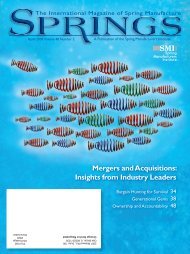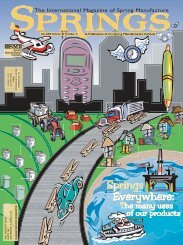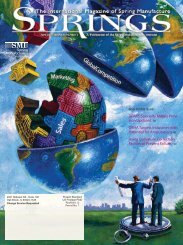Solid Height - Spring Manufacturers Institute
Solid Height - Spring Manufacturers Institute
Solid Height - Spring Manufacturers Institute
Create successful ePaper yourself
Turn your PDF publications into a flip-book with our unique Google optimized e-Paper software.
engineering alloys, make it the “ideal” spring material<br />
for space- or weight-sensitive applications. For<br />
many years, the aerospace industry, the original<br />
prime mover in titanium development, has relied<br />
upon the low modulus of elasticity, high strength<br />
and low mass of Beta-C titanium (Ti-3Al-8V-6Cr-<br />
4Mo-4Zr) for springs comparable in size to those<br />
used by automobile and motorcycle producers.<br />
However, Beta-C has an inherently expensive chemistry<br />
and requires lengthy production steps. Its high<br />
strength is achieved through long age treatments<br />
(24-hour cycles for the finished parts are common)<br />
or cold work steps, or both. This gives Beta-C a cost<br />
structure that rules out consideration for volumeproduction<br />
motor vehicle applications.<br />
To meet the production cycle and cost requirements<br />
of vehicle manufacturers, Timet developed<br />
and patented Timetal LCB titanium (low-cost beta;<br />
Ti-6.8Mo-4.5Fe-1.5 Al), which uses an altered alloy<br />
formulation and a substantially less expensive Fe-<br />
Mo (iron-molybdenum) master alloy than Beta-C. Its<br />
high strength is attributable to alloy chemistry rather<br />
than additional processing steps. Extended aging<br />
and cold work steps are not required. Age times are<br />
compatible with the thermal cycles available in the<br />
existing infrastructure for steel spring processing.<br />
In addition to being lower in cost than Beta-C, from<br />
a structural efficiency perspective, meaning spring<br />
response per unit of mass, the alloy’s low shear<br />
modulus (45 percent less than CrSi spring steel)<br />
combined with its high strength make Timetal LCB<br />
an ideal spring material for vehicle applications.<br />
Growing <strong>Spring</strong> Applications<br />
The first automotive application of Timetal LCB<br />
was as the rear suspension springs on the 2001<br />
Volkswagen Lupo FSI, noted for being a small<br />
automobile that achieved surprising performance<br />
with very high fuel efficiency, due in part to its light<br />
weight. More recently, again with the design objective<br />
of reducing weight but for entirely different reasons,<br />
the 2004 Ferrari Challenge Stradale became the first<br />
production car to use Timetal LCB titanium suspension<br />
springs throughout. Ferrari selected titanium<br />
suspension springs to reduce vehicle weight, reduce<br />
unsprung weight and improve performance.<br />
Weight reduction on a motorcycle can have<br />
as great an effect on performance as it can on an<br />
automobile. However, to fully appreciate the meaning<br />
of weight reduction on a motorcycle, the level<br />
of difficulty in achieving it and its value to the<br />
manufacturer, a comparison is useful: A one-pound<br />
reduction on a 200 lb. high-performance motorcycle<br />
would be equivalent to a 14.1 lb. reduction (a notable<br />
accomplishment) on the already exceptionally light<br />
Ferrari Challenge Stradale, which weighs 2,822<br />
50 SPRINGS July 2006<br />
lbs. By definition, however,<br />
motorcycle engineers<br />
have far fewer components<br />
to even consider when<br />
trying to reduce weight.<br />
When viewed in this light,<br />
it is easy to see why the<br />
appreciation for titanium<br />
by motorcycle and automobile<br />
design engineers is<br />
growing rapidly.<br />
Increasing numbers of<br />
manufacturers are recognizing<br />
that titanium offers<br />
proven and straightforward solutions to a variety<br />
of weight-reduction and performance-improvement<br />
challenges. Yamaha’s use of titanium in a range of<br />
applications is visible, significant and has continued<br />
to grow, and there is strong evidence that others are<br />
learning from their positive experience.”<br />
Kurt Faller is the president of Timet Automotive<br />
in Morgan Town, PA, the automotive operation of<br />
Titanium Metals Corp. (Timet). With headquarters in<br />
Dallas, TX, Timet is a worldwide integrated producer<br />
of titanium metal products. Information about Timet is<br />
available on the Web site at www.timet.com. v





